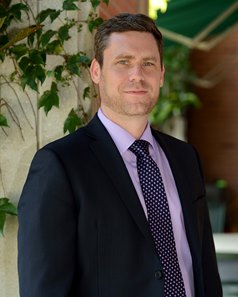
NYRA president and CEO David O'Rourke says the amended sports betting bill poses a direct threat to racing in New York State
Courtesy of NYRA
Racing interests warned New York lawmakers May 8 that their industry will face further erosion if tracks and off-track betting corporations in the state are not permitted to take part in an online sports betting effort under consideration at the state Capitol.
New York Racing Association president and CEO David O'Rourke said the state risks isolating tracks and OTBs if sports betting is limited to online and in-person wagering offered via commercial and Native American casinos in the state.
During a lengthy hearing called by Senator Joseph Addabbo, a Queens Democrat who heads the Senate's racing and wagering committee, O'Rourke said a recently amended sports betting bill that eliminated tracks and OTBs from participating in sports wagering "poses a direct threat to horse racing in New York State."
The NYRA leader said the state would be missing "the best opportunity in modern memory to grow the sport" of horse racing if the industry was not able to participate in online sports betting.
Four commercial casinos, as well as Indian-owned casinos, are expected sometime this year to be permitted by the state to offer in-person sports betting. Some lawmakers, such as Addabbo, are pushing an effort to expand such gambling to mobile platforms in which bettors in any part of the state could wager on their phones, laptops, and other electronic devices through sports books operated by the casinos.
"We believe sports betting can open a new demographic for us," O'Rourke told senators during a hearing that attracted in-person and written testimony from representatives of the NFL, NBA, PGA, players' associations representing professional football, baseball, hockey, basketball, and soccer athletes, as well as casinos and sports betting operators.
O'Rourke and other racing industry executives promoted an argument that tracks and OTBs have long been in the business of taking sports wagers. He said NYRA has more than 60 years of experience "working under comprehensive state regulatory oversight to provide customers with quality wagering services on the sport of horse racing."
But Addabbo told the industry representatives, who included executives from the breeders and NYRA horsemen's group, that recent changes made to his legislation to remove sports betting via tracks and OTBs was done, in part, to address state constitutional issues that some critics have raised. Gov. Andrew Cuomo has also said it will take a change in the state constitution—a multi-year effort—to permit online sports wagering.
"We are bound by the language of the constitution," Addabbo said Wednesday. He said he's ready to work to find ways to assist the horse racing industry "in ways aside from sports betting." He did not elaborate.
Joseph Appelbaum, president of the New York Thoroughbred Horsemen's Association, said the legislature's new version eliminating tracks, racinos, and OTBs from participating in sports betting will give an unfair advantage to a "relatively small number of operators."
Appelbaum said the state risks creating a new kind of bookmaker system for sports wagering, "essentially the same system as the illicit ones that this law surely hopes to eradicate."
Lawmakers and advocates of the new version, however, say there are many consumer protections built into the plan.
"Take your time," Appelbaum urged senators on the sports betting issue. The 2019 session ends June 19 in Albany, and Addabbo noted at the end of the hearing that there is still much work to be done on the topic.
A fallback position that Addabbo said he hopes to avoid if his bill—allowing online sports betting within 30 days of passage—does not advance is to try to pass a constitutional amendment legalizing mobile sports betting. That would require a second passage by lawmakers again in 2021 and then a statewide referendum by voters.
Appelbaum wondered aloud to senators about licensing requirements for those connected in any way to sports betting. He said workers in all aspects of horse racing must be licensed by the state.
"Shouldn't all their employees and coaches and locker room attendants be licensed too?" he asked of sports leagues and others that might be involved in sports betting.
Appelbaum warned that a poorly designed or fragmented sports gambling system would never meet its potential. He pointed to four commercial casinos and fantasy sports—both legalized in recent years and with lower-than-predicted revenues—as examples.
Jeffrey Cannizzo, executive director of the New York Thoroughbred Breeders Inc., said lawmakers need to question whether the current sports betting bill would maximize revenues that could be realized.
"We've been in sports betting. ... There's many lessons learned and we should be part of that equation," he said.
Cannizzo pointed to recent successes in New York breeding programs and that the equine industry is the second largest component of the agriculture sector in the state.
"To the extent that New York is going to implement a sports wagering option, it is imperative that the state not grant casinos a business advantage over NYRA," he said in his testimony. He asked lawmakers to reconsider the changes under the bill amended last week by Addabbo and its Assembly sponsor, Assemblyman Gary Pretlow, a Westchester County Democrat who chairs the Assembly racing and wagering committee.
Suffolk County OTB vice president Anthony Pancella told lawmakers that his OTB operation on the east end of Long Island contributed nearly $100 million in tax revenues to New York State last year.
"It may be reduced if we don't have the opportunity to participate in sports wagering in the state," he said.




No comments:
Post a Comment